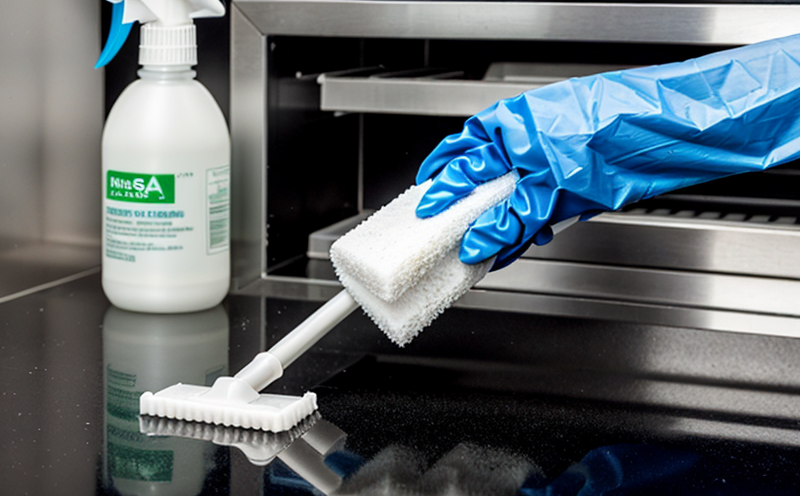EN ISO 846 Plastics Microbial Degradation Testing
The EN ISO 846 standard specifies a method to determine the resistance of plastics to microbial degradation. This test is particularly important for materials intended for use in cleaning and hygiene applications, where contamination from microorganisms can be detrimental to health and safety.
This testing process involves subjecting plastic samples to controlled conditions that simulate real-world scenarios. The specimens are exposed to a microbial challenge, which includes bacteria, fungi, or other relevant microorganisms. Over time, the extent of degradation is measured by assessing changes in physical properties such as weight loss, tensile strength, and appearance.
The test parameters for EN ISO 846 include specific humidity and temperature conditions, duration of exposure, and the type of microbial challenge used. These factors are crucial in ensuring accurate and reliable results that reflect real-world performance. Specimen preparation involves careful selection to ensure representativeness, which is essential for valid testing.
Once the test is complete, detailed reporting provides comprehensive insights into the degradation process. This includes quantitative data on weight loss, visual observations of changes in color or texture, and any other relevant physical properties affected by microbial activity. Understanding these details helps stakeholders make informed decisions about product design, material selection, and compliance with regulations.
The importance of EN ISO 846 testing extends beyond just cleaning and hygiene plastics; it is a fundamental aspect of ensuring the safety and efficacy of products in various sectors where microbial contamination can pose risks. For instance, in medical devices, food packaging, and consumer goods, this test ensures that materials do not degrade to levels that could compromise product integrity or user health.
Compliance with EN ISO 846 is critical for industries subject to stringent regulatory requirements. Failure to meet these standards can lead to product recalls, legal issues, and loss of market share. By investing in this testing service, companies demonstrate their commitment to quality and safety, fostering trust among consumers and stakeholders.
The process begins with thorough specimen preparation, followed by exposure under controlled conditions. Post-test analysis provides a clear picture of the plastic's resistance to microbial degradation, offering valuable data for improvement and innovation. This comprehensive approach ensures that products meet or exceed industry standards, enhancing their performance and reliability in demanding environments.
Why Choose This Test
Selecting EN ISO 846 Plastics Microbial Degradation Testing is crucial for several reasons:
- Regulatory Compliance: Ensures adherence to international standards, which is essential for market access and regulatory approval.
- Risk Mitigation: Reduces the risk of product failure due to microbial degradation, thereby protecting consumer health and safety.
- Quality Assurance: Provides robust data on material performance under real-world conditions, enhancing overall product quality.
- Innovation Support: Offers insights that can drive innovation in material selection and formulation, leading to safer and more effective products.
The test's reliability is further enhanced by its stringent protocols and controlled environmental conditions. This ensures that the results are consistent and repeatable, providing a solid foundation for decision-making.
Quality and Reliability Assurance
- Controlled Environmental Conditions: Precise humidity and temperature settings simulate real-world scenarios accurately.
- Microbial Challenge Variability: Exposure to various types of microbes ensures comprehensive testing across different environmental conditions.
- Data Consistency: Reproducible results enhance confidence in the test outcomes, supporting consistent quality standards.
- Compliance Verification: Ensures that products meet international regulatory requirements for cleaning and hygiene applications.
The reliability of EN ISO 846 testing is further bolstered by adherence to stringent protocols and continuous calibration of equipment. This ensures that all tests are conducted under the same controlled conditions, providing consistent and accurate results.
Use Cases and Application Examples
| Use Case | Description |
|---|---|
| Medical Device Packaging: | Evaluates the durability of plastic packaging used in medical devices to ensure it remains intact and sterile. |
| Food Contact Materials: | Determines the resistance of plastics used for food contact applications to microbial contamination, ensuring safety. |
| Cleaning Products: | Assesses the performance of plastic components in cleaning products under real-world conditions to ensure effectiveness and safety. |
| Consumer Goods: | Evaluates the durability of plastics used in consumer goods, such as toys or household items, ensuring they do not degrade over time. |
| Sanitary Facilities: | Tests plastic materials used in sanitary facilities to ensure they remain hygienic and free from microbial contamination. |
The versatility of EN ISO 846 testing makes it applicable across numerous industries. By understanding the specific requirements of each use case, stakeholders can tailor their testing strategies to meet regulatory expectations and enhance product performance.





